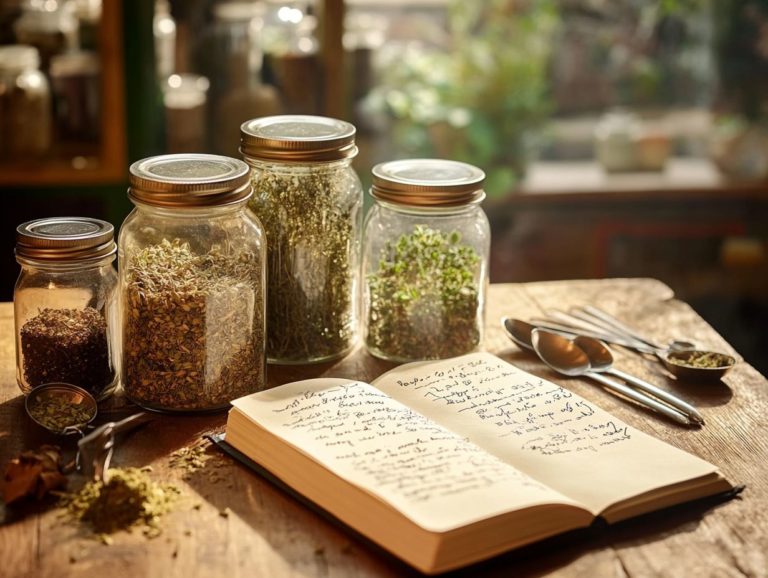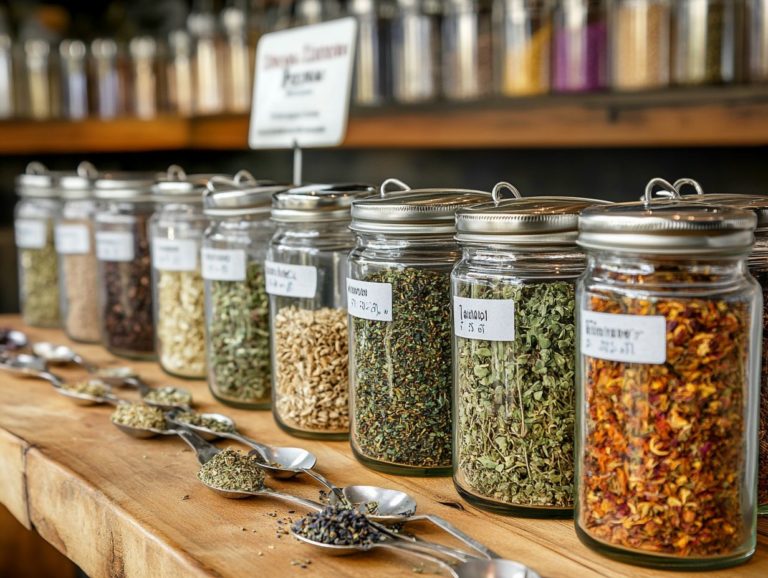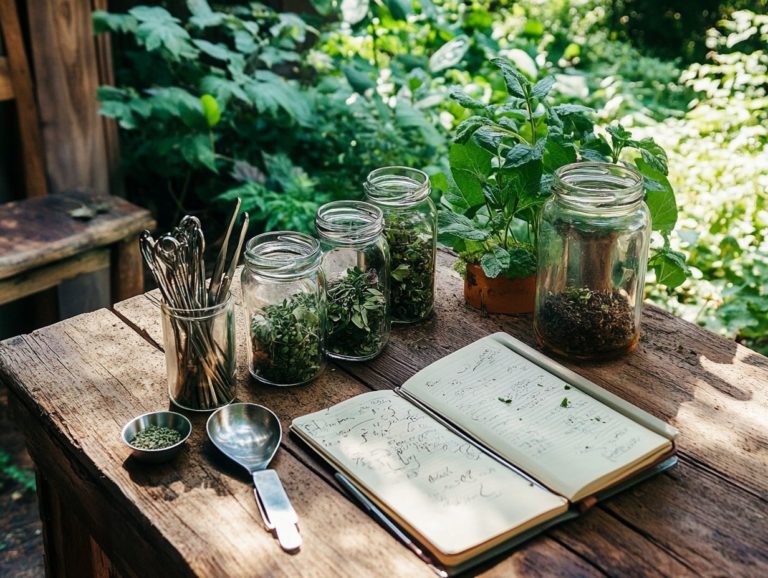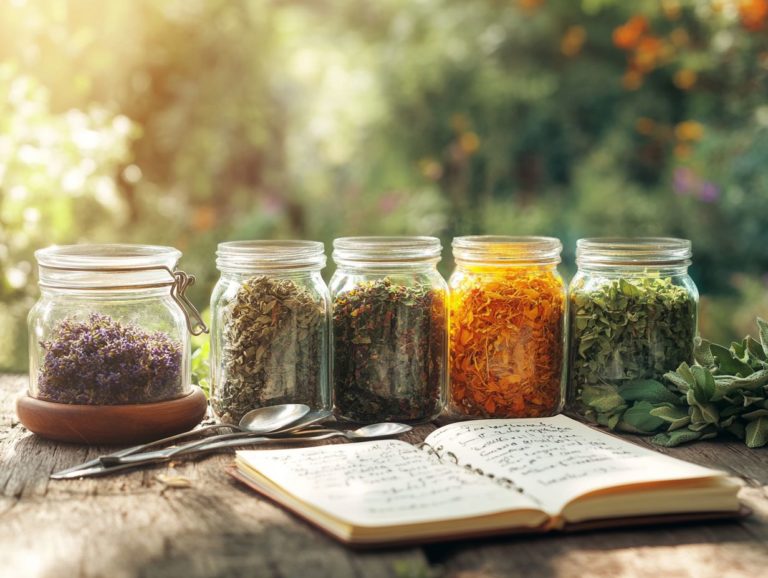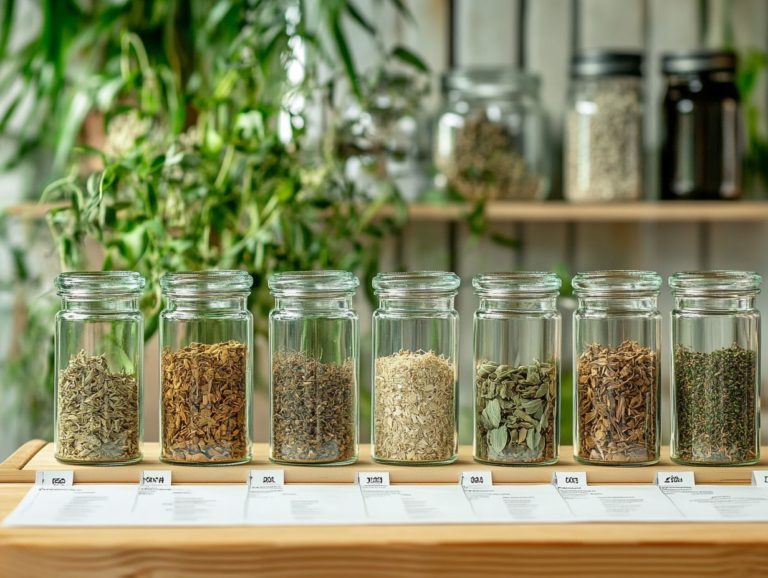Herbal Safety: Dosage Information for Athletes
Herbal supplements have become increasingly popular among athletes seeking natural methods to boost performance, enhance recovery, and promote overall well-being. Ready to discover how herbal supplements can transform your training? Let s dive in!
The realm of herbal remedies is intricate, with various dosages and potential risks that you should carefully consider.
This article delves into the factors that influence herbal dosages, offers recommended amounts for well-known herbs, and highlights potential interactions with medications. You’ll also find essential tips for safely integrating these supplements into your routine. Join us as we explore the critical aspects of herbal safety tailored specifically for athletes.
Contents
- Key Takeaways:
- Understanding Herbal Dosages
- Potential Risks of Herbal Supplements for Athletes
- Tips for Athletes Using Herbal Supplements
- Frequently Asked Questions
- What is herbal safety and why is it important for athletes?
- How do I determine the correct dosage of herbal supplements for athletes?
- Are there any herbal supplements that are not safe for athletes?
- Can athletes take multiple herbal supplements at once?
- What should athletes look for when purchasing herbal supplements?
- Can herbal supplements be taken in combination with prescription medications for athletes?
Key Takeaways:
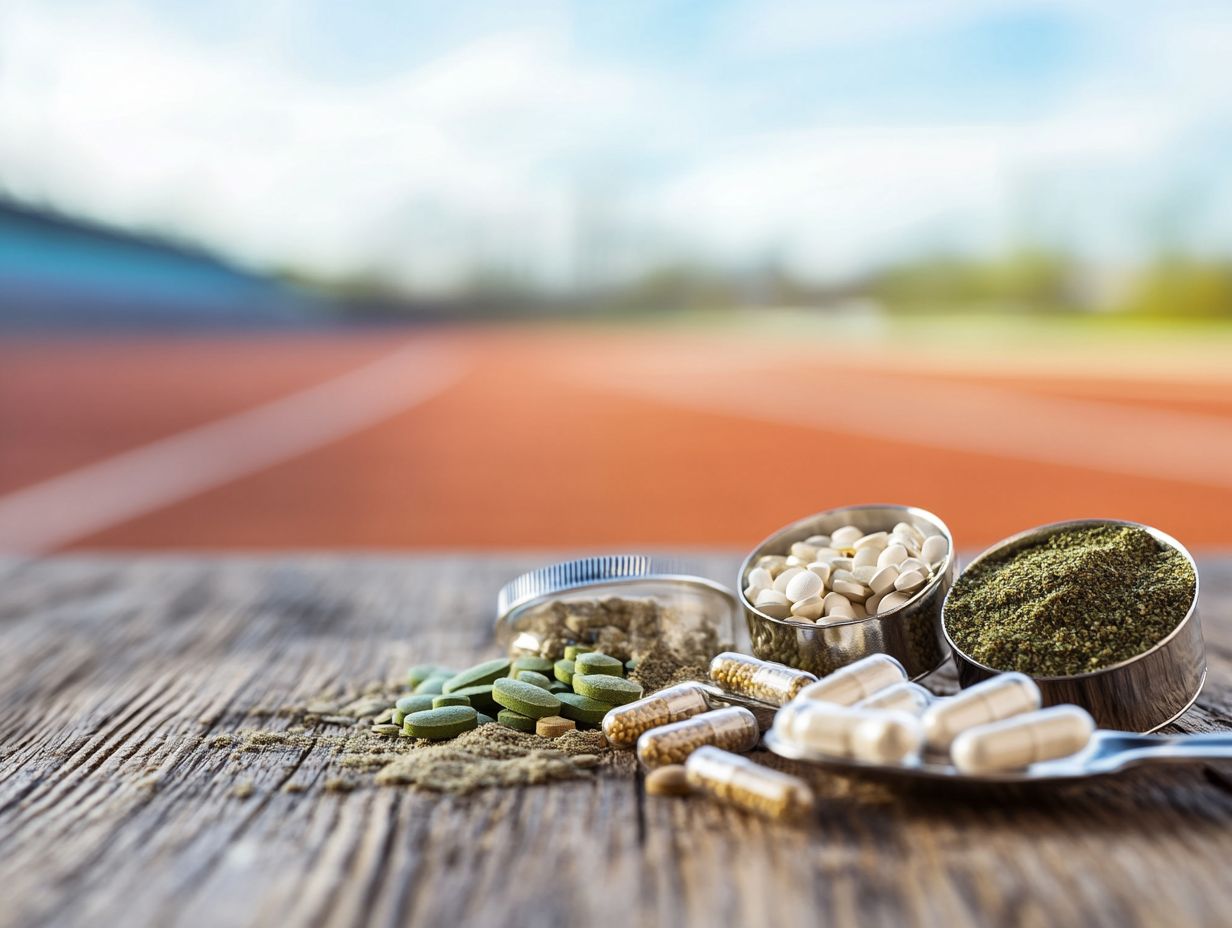
- Herbal supplements are commonly used by athletes, but understanding proper dosage is crucial for safety and effectiveness.
- Factors like weight, age, and health conditions can affect herbal dosage, and it is important to follow recommended guidelines.
- Athletes should be aware of potential risks such as interactions with medications and contamination. Consulting a healthcare professional and doing proper research before incorporating herbal supplements into their routine is essential.
Why Herbal Supplements are Popular Among Athletes
Herbal supplements are popular among athletes like you. They offer benefits such as improved performance and faster recovery. These natural products, brimming with natural compounds in plants, play a vital role in sports nutrition, supporting energy metabolism and alleviating muscle soreness.
Many athletes turn to dietary supplements such as ginseng, echinacea, and ginger not just to improve endurance but also to strengthen their immune systems. Understanding herbal safety is crucial to ensure they maintain peak performance during rigorous training and competitions.
With the rising interest in herbal medicine, you may find yourself exploring herbal formulas that have shown promise in clinical trials for performance enhancement. This trend reflects a broader consumer shift, as athletes seek alternatives to traditional supplements, motivated by a desire for cleaner, more natural ingredients. It’s important to consider herbal supplements and their recommended dosages to ensure safety and effectiveness.
Market research indicates a notable increase in products containing herbs that help the body manage stress like ashwagandha, which can help reduce stress and improve recovery, or turmeric, celebrated for its anti-inflammatory benefits. These herbs not only bolster your performance but also support long-term health, embodying a holistic approach to athletic wellness. For safe and effective use, it’s essential to follow balancing herbal remedies dosage guidelines.
The demand for high-quality herbal supplements is thriving, as more athletes recognize their potential benefits and seamlessly incorporate them into their training routines.
Understanding Herbal Dosages
Understanding the right herbal dosages is essential for you as an athlete aiming to reap the benefits of dietary supplements while steering clear of any adverse effects. Proper dosing not only ensures safety but also enhances effectiveness.
Various herbal ingredients like ginseng, echinacea, and ginger come with distinct recommended dosages derived from clinical trials and research reviews. It’s wise to consult health professionals to pinpoint the optimal amounts of these herbal formulas, taking into account your individual training intensity and overall health. Additionally, consider exploring the best herbal teas for athletes to enhance your performance.
Factors Affecting Dosage
Several factors can greatly affect the dosage of herbal supplements for you as an athlete. Your individual needs, training intensity, and the specific herbal ingredients are all crucial. For instance, your body weight, age, and metabolic rate can significantly influence how your body reacts to various herbs like cayenne or devil’s claw. This makes personalized dosing vital for maximizing health benefits while minimizing potential risks.
Your lifestyle choices, including your diet and sleep patterns, are integral in determining the optimal dosages of these herbs. Nutritional requirements fluctuate based on your training intensity, impacting nutrient absorption and utilization. For example, if you follow a high-protein diet, you might find that herbs that help your muscles recover work more effectively for you. Conversely, inadequate sleep can thwart those benefits. Don’t forget to consider the unique properties of each herb; for instance, ashwagandha may provide stress relief, while ginseng could enhance your endurance. For more detailed information, check out the dosage recommendations for popular herbs.
In essence, the intricate interplay between your lifestyle factors and your unique responses to these herbs plays a critical role in shaping the overall effectiveness and safety of your supplementation.
Recommended Dosages for Popular Herbs
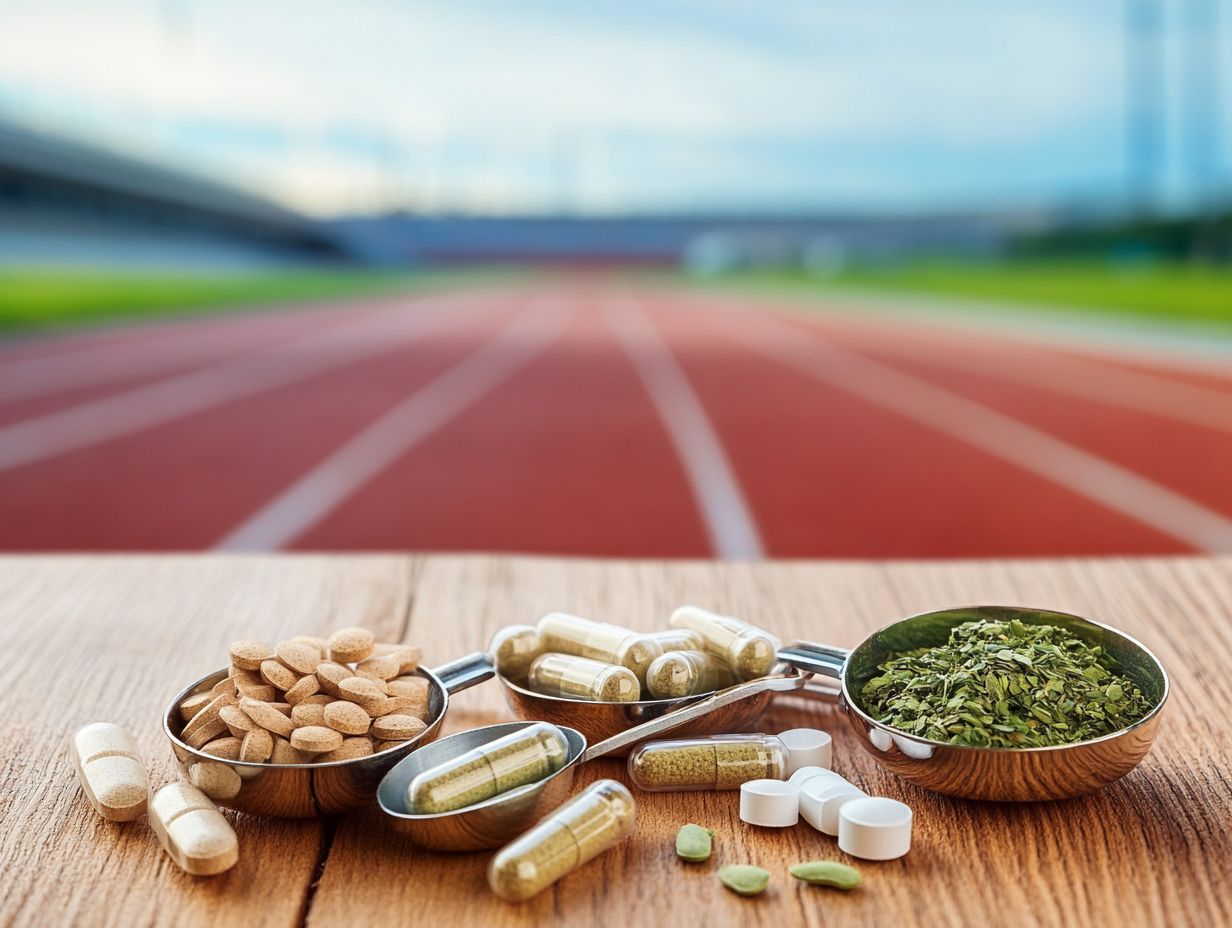
Recommended dosages for popular herbs can vary significantly, and it s essential for you as an athlete to follow these guidelines to ensure both safety and effectiveness. For instance, studies suggest a dosage of 200-400 mg of ginseng per day to enhance your athletic performance, while echinacea may be taken at 300-500 mg to give your immune system a boost. Knowing the recommended dosages helps you use herbal supplements effectively while minimizing the risk of adverse side effects.
Turmeric is often recommended at a dosage of 500-1000 mg daily, particularly beneficial for those recovering from intense workouts. If you’re looking to enhance your endurance, beetroot powder has gained popularity, with studies indicating effective results at about 300-600 mg per day. The potential benefits of ashwagandha, known for its stress-reducing properties and improved recovery times, can be realized with daily doses of 300-500 mg. For more information on safe dosages of various herbal remedies, check out herbal remedies: safe dosage for adults and children.
Notably, clinical trials have consistently shown positive outcomes with these dosages, but you must consult healthcare professionals before adding any new supplement to your regimen.
Potential Risks of Herbal Supplements for Athletes
While herbal supplements can provide a host of benefits for athletes, it s crucial to recognize the potential risks that come with them, such as adverse effects and interactions with medications or other supplements.
You should stay well-informed about the quality control issues that often plague herbal products. Remember that they aren t strictly regulated by the FDA during manufacturing.
Grasping these risks is essential for making smart choices about supplementation, ensuring that your training and performance remain uncompromised.
Interactions with Medications and Other Supplements
Interactions between medications and herbal supplements can present significant risks for you as an athlete. It’s crucial to understand these potential conflicts to protect your health and performance.
Take St. John’s Wort, for example. While it s often used to enhance mood, it can significantly diminish the effectiveness of certain medications, especially antidepressants and contraceptive pills, by speeding up their metabolism.
If you’re using omega-3 supplements for inflammation management, be cautious; these can interact with blood thinners, increasing the risk of bleeding.
Herbal products like kava, designed for anxiety relief, may sound appealing, but they come with their own set of risks, including liver toxicity and heightened sedative effects when combined with other medications. For older adults, it’s crucial to be aware of proper usage; consider reviewing herbal remedies dosage tips to avoid impairing your performance during competitions.
Given these complexities, you must consult with healthcare professionals before making decisions about your supplement use. It’s also important to consider herbal remedies: understanding side effects and dosages. Making informed choices is key to maintaining both your health and competitive edge.
Contamination and Quality Control Issues
Contamination and quality control issues are paramount concerns for you as an athlete when considering herbal supplements. These issues directly influence safety and effectiveness. The herbal products market often lacks stringent regulatory standards, resulting in variations in strength, potential harmful contaminants, or incorrect labeling of ingredients all of which can have serious repercussions for your health and performance.
As more athletes seek these supplements for enhanced performance, the pressing need for quality assurance has never been clearer. If a product is contaminated with heavy metals, pesticides, or microbes, the risks can escalate from minor health issues to significant safety hazards.
Regulatory bodies play a crucial role in overseeing these products, ensuring they adhere to safety and efficacy guidelines. This underscores the importance of choosing reputable brands that perform rigorous, independent testing and certification. By prioritizing these factors, you can better safeguard your health while gaining a competitive edge.
Tips for Athletes Using Herbal Supplements
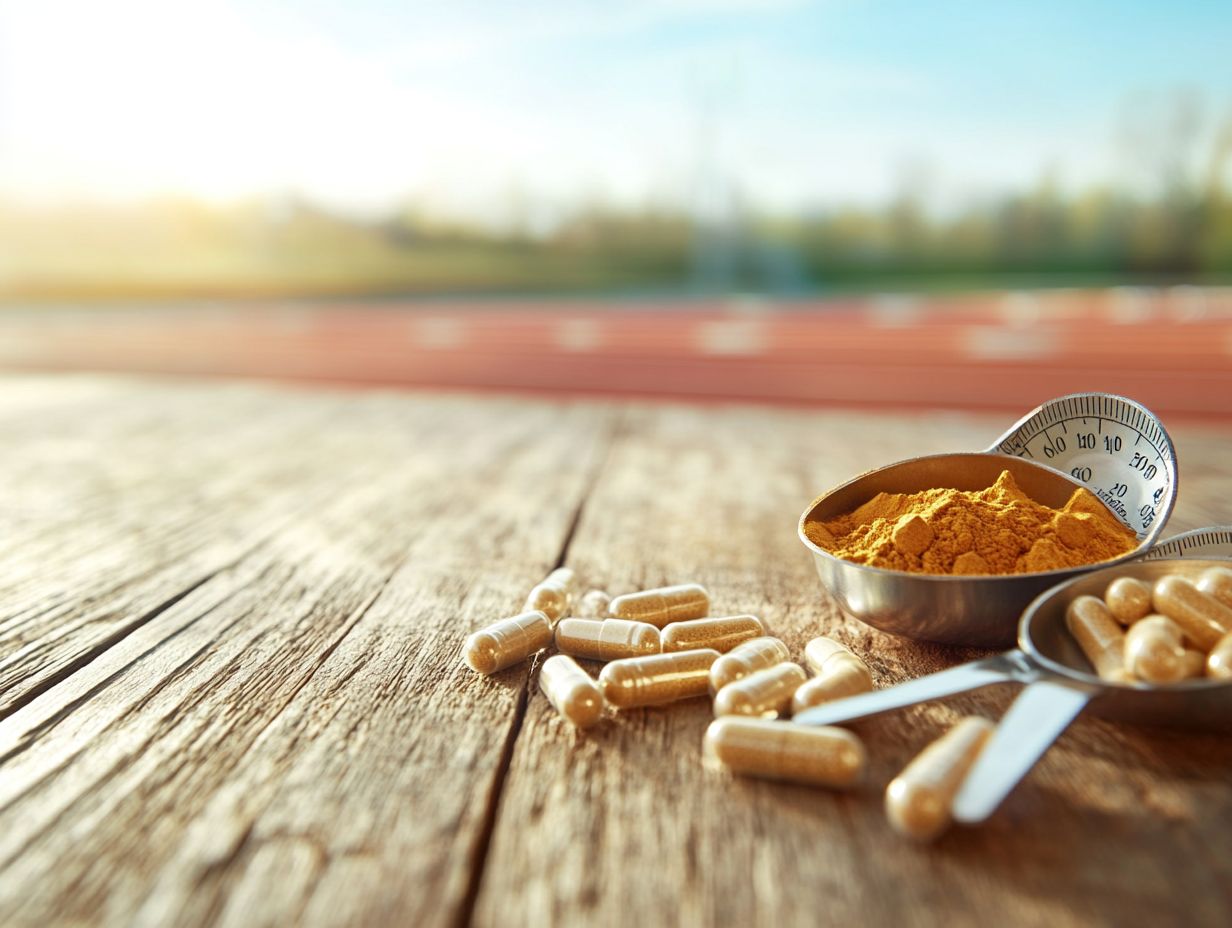
For athletes contemplating herbal supplements, following a set of best practices can significantly elevate both safety and performance. It’s essential for you to consult with a healthcare professional to ensure that any herbal products you choose align with your specific health needs and training objectives.
You should also master reading labels and conducting thorough research on herbal supplements. This will empower you to make well-informed decisions about your supplementation regimen.
Consulting with a Healthcare Professional
Consulting with a healthcare professional is an essential step for you as an athlete considering herbal supplements. These experts can offer personalized advice on both safety and effectiveness tailored to your unique health profile. A qualified healthcare provider will assess your individual circumstances and evaluate any potential interactions with medications.
Moreover, these professionals stay updated on the latest research surrounding herbal formulations, including how environment affects herbal dosage safety. This ensures that you make informed choices rather than relying on anecdotal evidence or marketing hype. By taking the time to discuss your supplementation options with a knowledgeable expert, you’ll gain a clearer understanding of the benefits and potential side effects of various herbs.
This proactive approach optimizes your training and promotes safety. It ensures that your pursuit of performance enhancement aligns harmoniously with your overall health goals.
Proper Label Reading and Research
Proper label reading and thorough research are essential practices for athletes like you using herbal supplements. These practices ensure you make safe and effective choices.
By carefully examining the ingredient list, you can identify any potential allergens or additives that might compromise your health. Understanding herbal dosage guidelines for pregnant women is crucial, as it helps you avoid overconsumption, which can lead to unpleasant side effects.
Sourcing information is equally important; it allows you to discern the purity of the herbal supplements, steering clear of products that may contain harmful contaminants, fillers, or additives. Engaging with reputable manufacturers and seeking out certifications can further assure you of the supplements’ quality.
This diligent approach not only enhances your performance but also contributes positively to your overall well-being.
Frequently Asked Questions
What is herbal safety and why is it important for athletes?
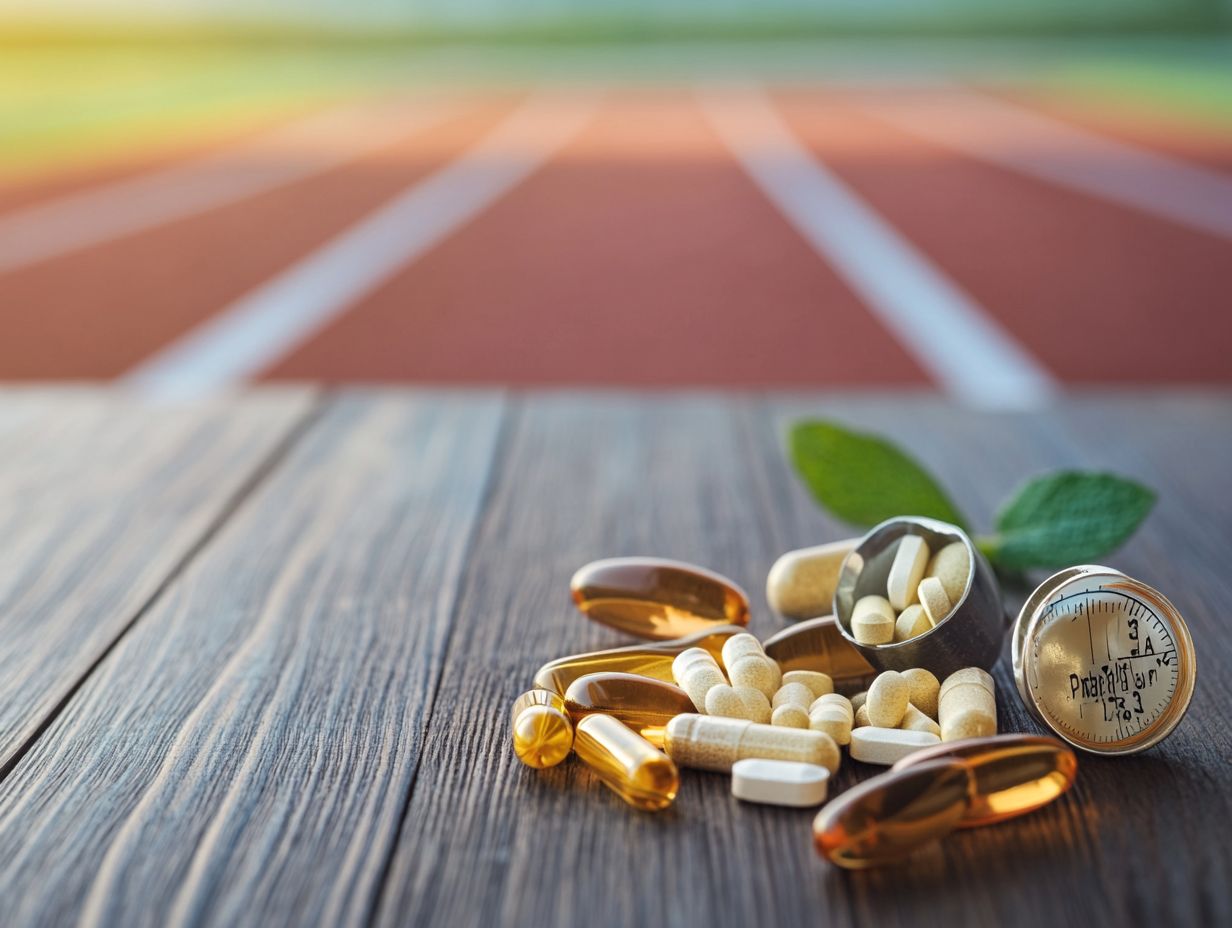
Herbal safety refers to the precautions and guidelines for using herbal supplements safely and effectively. It is especially important for athletes to follow these guidelines to avoid any potential negative effects on their performance and health.
How can you choose safe herbal supplements?
Start today by consulting a professional and exploring reputable brands!
How do I determine the correct dosage of herbal supplements for athletes?
Dosage for herbal supplements depends on the herb, body weight, and health. Always check with a healthcare professional or herbalist.
Are there any herbal supplements that are not safe for athletes?
Some herbal supplements may not be safe for athletes. They can interact with medications or health issues.
Can athletes take multiple herbal supplements at once?
Athletes should avoid taking multiple herbal supplements at once. This can lead to harmful interactions.
What should athletes look for when purchasing herbal supplements?
When buying herbal supplements, athletes should choose those certified by trusted organizations like the United States Pharmacopeia (USP) or the National Sanitation Foundation (NSF). Always check the ingredients list, too.
Can herbal supplements be taken in combination with prescription medications for athletes?
Athletes must talk to their healthcare provider before mixing herbal supplements with prescription drugs. Some herbs can cause negative effects with certain medications.

